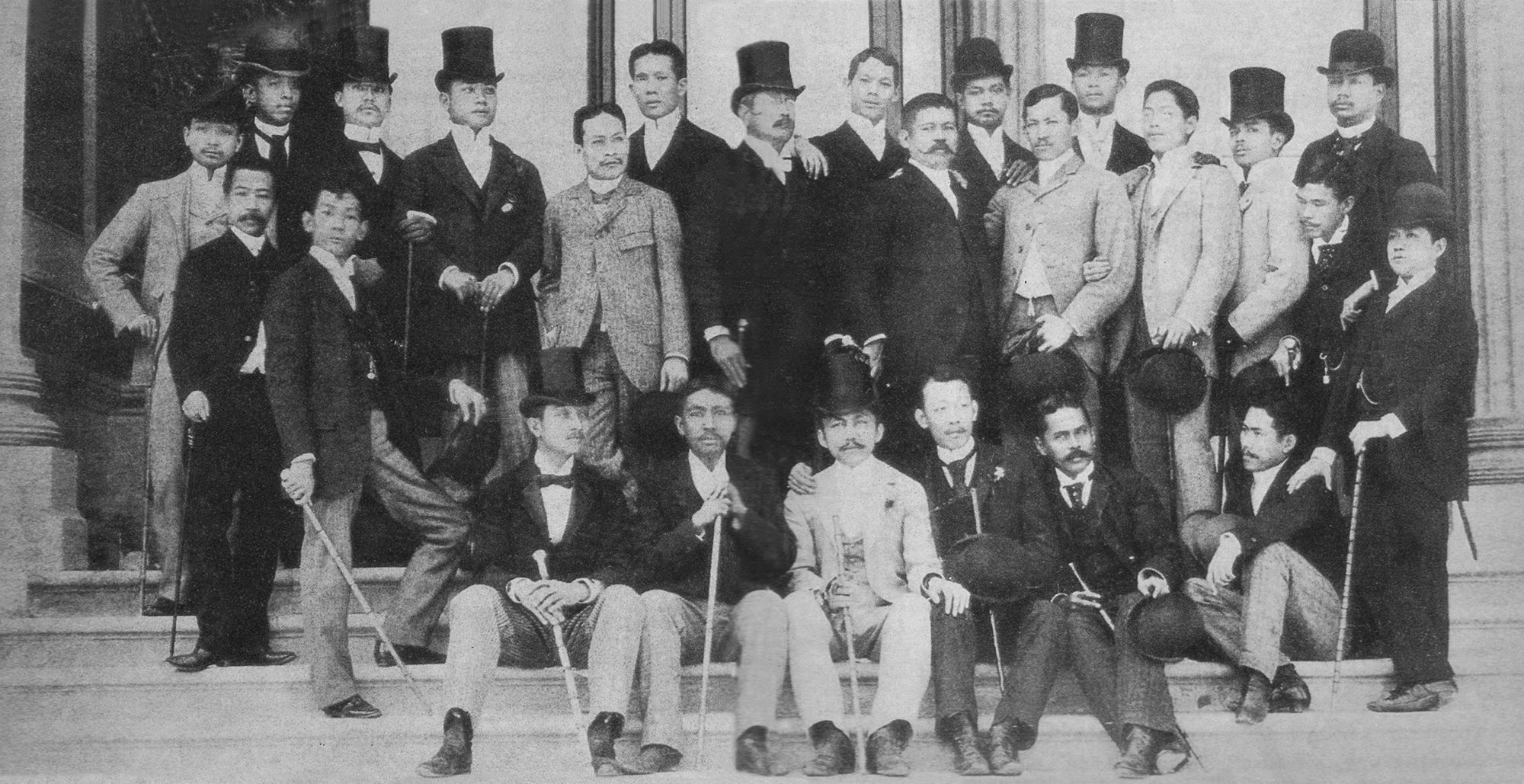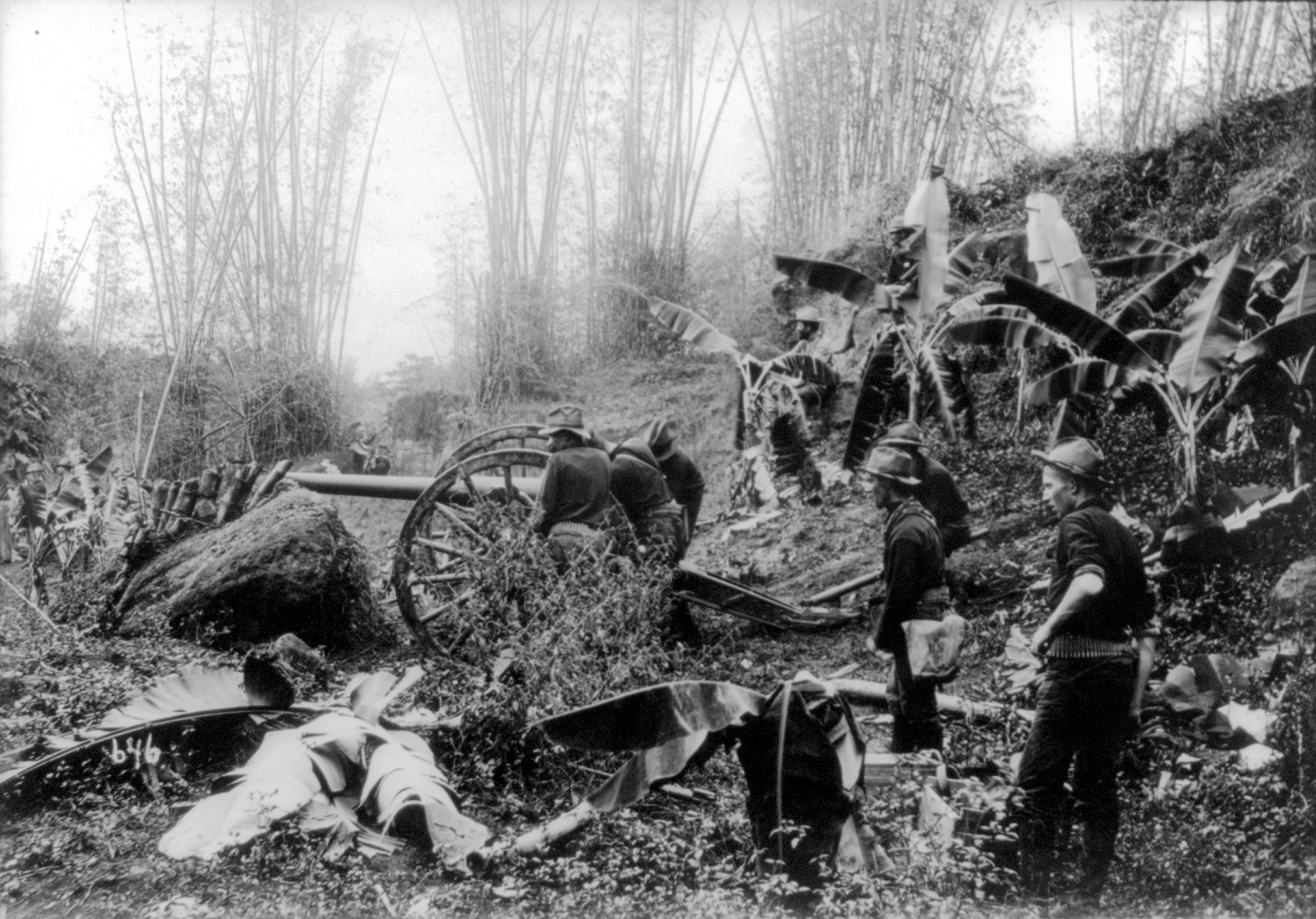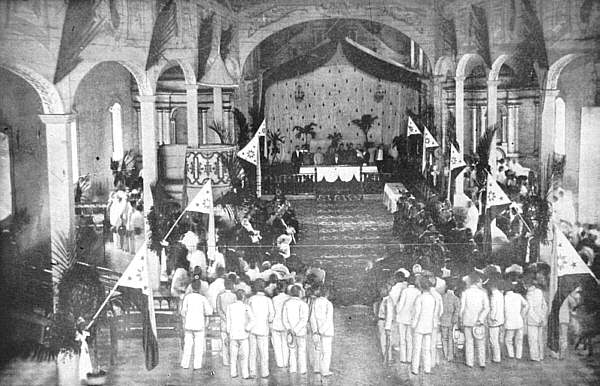|
Basilio Augustín
Basilio Augustín y Dávila (February 12, 1840 – August 7, 1910) was briefly a Spanish Governor-General of the Philippines, from April 11 to July 24, 1898. During his tenure, the Spanish–American War began, which he assured the Spanish would be "short" and "decisive". Spanish forces were decisively defeated by the American Navy in the Battle of Manila Bay. This defeat led to the return of revolutionary leader Emilio Aguinaldo from exile and the beginning of the second phase of the Philippine Revolution, during which, on June 12, 1898, Aguinaldo issued the Philippine Declaration of Independence. Augustín attempted to create a consultative assembly of Filipino Ilustrados loyal to Spain and a militia of Filipinos, as a way to support autonomy in the Philippines. He offered one million pesos to Aguinaldo but the latter refused. However, it did gain following from reputable figures from the revolutionaries such as Artemio Ricarte and Emiliano Riego de Dios due to the efforts of ... [...More Info...] [...Related Items...] OR: [Wikipedia] [Google] [Baidu] |
The Most Excellent
The Most Excellent ( Spanish: ''Excelentísimo Señor'' (male) or ''Excelentísima Señora'' (female), literally "Most Excellent Sir/Madam") is an honorific prefix that is traditionally applied to certain people in Spain and certain Spanish-speaking countries. Following Spanish tradition, it is an '' ex officio'' style (the holder has it as long as they remain in office, in the most important positions of state) and is used in written documents and very formal occasions. The prefix is similar (but not equal) to that of " His/Her Excellency", but in the 19th century "The Most Excellent" began to replace the former. The use of the prefix Excellency was re-introduced in Francoist Spain by ''Generalísimo'' Francisco Franco himself, who was formally styled as '' Su Excelencia el Jefe del Estado'' ("His Excellency The Head of State"), while his ministers and senior government officials continued using the prefix "The Most Excellent". The prefix " The Most Illustrious" (''Ilustrísimo ... [...More Info...] [...Related Items...] OR: [Wikipedia] [Google] [Baidu] |
Ilustrados
The Ilustrados (, "erudite", "learned" or "enlightened ones") constituted the Filipino educated class during the Spanish colonial period in the late 19th century. Elsewhere in New Spain (of which the Philippines were part), the term ''gente de razón'' carried a similar meaning. They were middle class Filipinos, many of whom were educated in Spain and exposed to Spanish liberal and European nationalist ideals. The ''Ilustrado'' class was composed of native-born intellectuals and cut across ethnolinguistic and racial lines—'' Indios'', '' Insulares'' and ''Mestizos'', among others—and sought reform through "a more equitable arrangement of both political and economic power" under Spanish tutelage. Stanley Karnow, in his '' In Our Image: America's Empire in the Philippines'', referred to the ''Ilustrados'' as the "rich Intelligentsia" because many were the children of wealthy landowners. They were key figures in the development of Filipino nationalism. [...More Info...] [...Related Items...] OR: [Wikipedia] [Google] [Baidu] |
Captains General Of The Philippines
Captain is a title, an appellative for the commanding officer of a military unit; the supreme leader of a navy ship, merchant ship, aeroplane, spacecraft, or other vessel; or the commander of a port, fire or police department, election precinct, etc. In militaries, the captain is typically at the level of an officer commanding a company or battalion of infantry, a ship, or a battery of artillery, or another distinct unit. The term also may be used as an informal or honorary title for persons in similar commanding roles. Etymology The term "captain" derives from (, , or 'the topmost'), which was used as title for a senior Byzantine military rank and office. The word was Latinized as capetanus/catepan, and its meaning seems to have merged with that of the late Latin "capitaneus" (which derives from the classical Latin word "caput", meaning head). This hybridized term gave rise to the English language term captain and its equivalents in other languages (, , , , , , , , , kapitány, K ... [...More Info...] [...Related Items...] OR: [Wikipedia] [Google] [Baidu] |
1910 Deaths
Year 191 ( CXCI) was a common year starting on Friday (link will display the full calendar) of the Julian calendar. At the time, it was known as the Year of the Consulship of Apronianus and Bradua (or, less frequently, year 944 ''Ab urbe condita''). The denomination 191 for this year has been used since the early medieval period, when the Anno Domini calendar era became the prevalent method in Europe for naming years. Events By place Parthia * King Vologases IV of Parthia dies after a 44-year reign, and is succeeded by his son Vologases V. China * A coalition of Chinese warlords from the east of Hangu Pass launches a punitive campaign against the warlord Dong Zhuo, who seized control of the central government in 189, and held the figurehead Emperor Xian hostage. After suffering some defeats against the coalition forces, Dong Zhuo forcefully relocates the imperial capital from Luoyang to Chang'an. Before leaving, Dong Zhuo orders his troops to loot the tombs of the Ha ... [...More Info...] [...Related Items...] OR: [Wikipedia] [Google] [Baidu] |
1840 Births
__NOTOC__ Year 184 ( CLXXXIV) was a leap year starting on Wednesday (link will display the full calendar) of the Julian calendar. At the time, it was known as the Year of the Consulship of Eggius and Aelianus (or, less frequently, year 937 ''Ab urbe condita''). The denomination 184 for this year has been used since the early medieval period, when the Anno Domini calendar era became the prevalent method in Europe for naming years. Events By place China * The Yellow Turban Rebellion and Liang Province Rebellion break out in China. * The Disasters of the Partisan Prohibitions ends. * Zhang Jue leads the peasant revolt against Emperor Ling of Han of the Eastern Han Dynasty. Heading for the capital of Luoyang, his massive and undisciplined army (360,000 men), burns and destroys government offices and outposts. * June – Ling of Han places his brother-in-law, He Jin, in command of the imperial army and sends them to attack the Yellow Turban rebels. * Winter – ... [...More Info...] [...Related Items...] OR: [Wikipedia] [Google] [Baidu] |
Fernando Primo De Rivera, 1st Marquis Of Estella
Fernando Primo de Rivera y Sobremonte, 1st Marquess of Estella (24 July 1831 – 23 May 1921) was a Spanish politician and soldier. Fernando Primo de Rivera was the son of Antonio Hermenegildo Primo de Rivera y Sobremonte and his wife Ana María de Torres Rovellas y Peña Vélez (1811–1865); she was the daughter of Miguel de Torres Rovellas y Peña Vélez, 13th Count of Torres Rovellas, 8th Marquess of Peña Vélez (1764–1851). His grandfather was Bértrand Primo de Rivera (1741–1813): he was a Spanish general under the Spanish Resistance against Napoleon Bonaparte. He served in several wars, including the 1848 and 1866 Madrid insurrections and the second Carlista War. When forces under his command in the second Carlist War captured Estella, he was named Marquess of Estella. He was the Spanish Governor-General of the Philippines from 1880 to 1883. In 1897, he again became the Spanish Governor-General of the Philippines. He temporarily suspended hostilities in the Phil ... [...More Info...] [...Related Items...] OR: [Wikipedia] [Google] [Baidu] |
Philippine–American War
The Philippine–American War or Filipino–American War ( es, Guerra filipina-estadounidense, tl, Digmaang Pilipino–Amerikano), previously referred to as the Philippine Insurrection or the Tagalog Insurgency by the United States, was an armed conflict between the First Philippine Republic and the United States that started on February 4, 1899, and ended on July 2, 1902. The conflict arose in 1898 when the United States, rather than acknowledging the Philippines' declaration of independence, annexed the Philippines under the Treaty of Paris at the conclusion of the Spanish–American War. The war can be seen as a continuation of the Philippine struggle for independence that began in 1896 with the Philippine Revolution against Spanish rule. Fighting erupted between forces of the United States and those of the Philippine Republic on February 4, 1899, in what became known as the 1899 Battle of Manila. On June 2, 1899, the First Philippine Republic officially declared war ag ... [...More Info...] [...Related Items...] OR: [Wikipedia] [Google] [Baidu] |
Treaty Of Paris (1898)
The Treaty of Peace between the United States of America and the Kingdom of Spain, commonly known as the Treaty of Paris of 1898 ( fil, Kasunduan sa Paris ng 1898; es, Tratado de París de 1898), was a treaty signed by Spain , image_flag = Bandera de España.svg , image_coat = Escudo de España (mazonado).svg , national_motto = '' Plus ultra'' ( Latin)(English: "Further Beyond") , national_anthem = (English: "Royal March") , ... and the United States on December 10, 1898, that ended the Spanish–American War. Under it, Spain relinquished all claim of sovereignty over and title to territories described there as ''the island of Porto Rico and other islands now under Spanish sovereignty in the West Indies, and the island of Guam in the Marianas or Ladrones'', the archipelago known as the Philippine Islands, and comprehending the islands lying within the following line:'' (details elided), and the Spanish East Indies, Philippines to the ... [...More Info...] [...Related Items...] OR: [Wikipedia] [Google] [Baidu] |
Malolos Congress
The Malolos Congress (also known as the Revolutionary Congress), formally known as the National Assembly, was the legislative body of the Revolutionary Government of the Philippines. Members were chosen in the elections held from June 23 to September 10, 1898. The assembly consisted of elected delegates chosen by balloting in provincial assemblies and appointed delegates chosen by the president to represent regions under unstable military and civilian conditions. The Revolutionary Congress was opened on September 15, 1898 at Barasoain Church in Malolos, Bulacan. President Emilio Aguinaldo presided over the opening session of the assembly. After the promulgation of the Malolos Constitution on January 22, 1899, replaced the revolutionary government with the Philippine Republic, the Malolos Congress became the legislative branch of that government, designated in the constitution as the ''Assembly of Representatives''. [...More Info...] [...Related Items...] OR: [Wikipedia] [Google] [Baidu] |
Malolos Constitution
The Political Constitution of 1899 ( es, Constitución Política de 1899), informally known as the Malolos Constitution, was the constitution of the First Philippine Republic. It was written by Felipe Calderón y Roca and Felipe Buencamino as an alternative to a pair of proposals to the Malolos Congress by Apolinario Mabini and Pedro Paterno. After a lengthy debate in the latter part of 1898, it was promulgated on 21 January 1899. The constitution placed limitations on unsupervised freedom of action by the chief executive which would have hampered rapid decision making. As it was created during the fight for Philippine independence from Spain, however, its Article 99 allowed unhampered executive freedom of action during wartime. Unsupervised executive governance continued throughout the Philippine–American War which erupted soon after proclamation. History Background After over 300 years of Spanish rule, the country developed from a small overseas colony governed from ... [...More Info...] [...Related Items...] OR: [Wikipedia] [Google] [Baidu] |
Pedro Paterno
Pedro Alejandro Paterno y de Vera IgnacioGarcía Castellón, Manuel. (February 27, 1857 – April 26, 1911, 993 pages) was a Filipino politician infamous for being a turncoat. He was also a poet and a novelist. His intervention on behalf of the Spanish led to the signing of the Pact of Biak-na-Bato on December 14, 1897, an account of which he published in 1910. Among his other works include the first novel written by a native Filipino, '' Ninay'' (1885), and the first Filipino collection of poems in Spanish, ''Sampaguitas y otras poesías varias'' ("Jasmines and Other Various Poems"), published in Madrid in 1880. Early life Paterno was born on February 17, 1857. He was a "child of privilege in a society of limited opportunities." He was one of 13 children born to Don Máximo Paterno and his second wife, Doña Carmen de Vera Ignacio. Máximo was exiled to Guam (then also part of the Spanish East Indies) for ten years following the 1872 Cavite mutiny and died on 26 July 1900, ... [...More Info...] [...Related Items...] OR: [Wikipedia] [Google] [Baidu] |
Artemio Ricarte
Artemio Ricarte y García (October 20, 1866 – July 31, 1945) was a Filipino general during the Philippine Revolution and the Philippine–American War. He is regarded as the ''Father of the Philippine Army'', and the first Chief of Staff of the Armed Forces of the Philippines (March 22, 1897- January 22, 1899) though the present Philippine Army descended from the American-allied forces that defeated the Philippine Revolutionary Army led by General Ricarte. Ricarte is notable for never having taken an oath of allegiance to the United States government that occupied the Philippines from 1898 to 1946. Early life From the legal union and matrimony of Esteban Ricarte y Faustino with Bonifacia Garcia y Rigonan were born three children: Uno, Artemio and Ylumidad, in the town of Batac, province of Ilocos Norte. Artemio finished his early studies in his hometown and moved to Manila for his tertiary education. He enrolled at the Colegio de San Juan de Letran graduating with a Bache ... [...More Info...] [...Related Items...] OR: [Wikipedia] [Google] [Baidu] |



